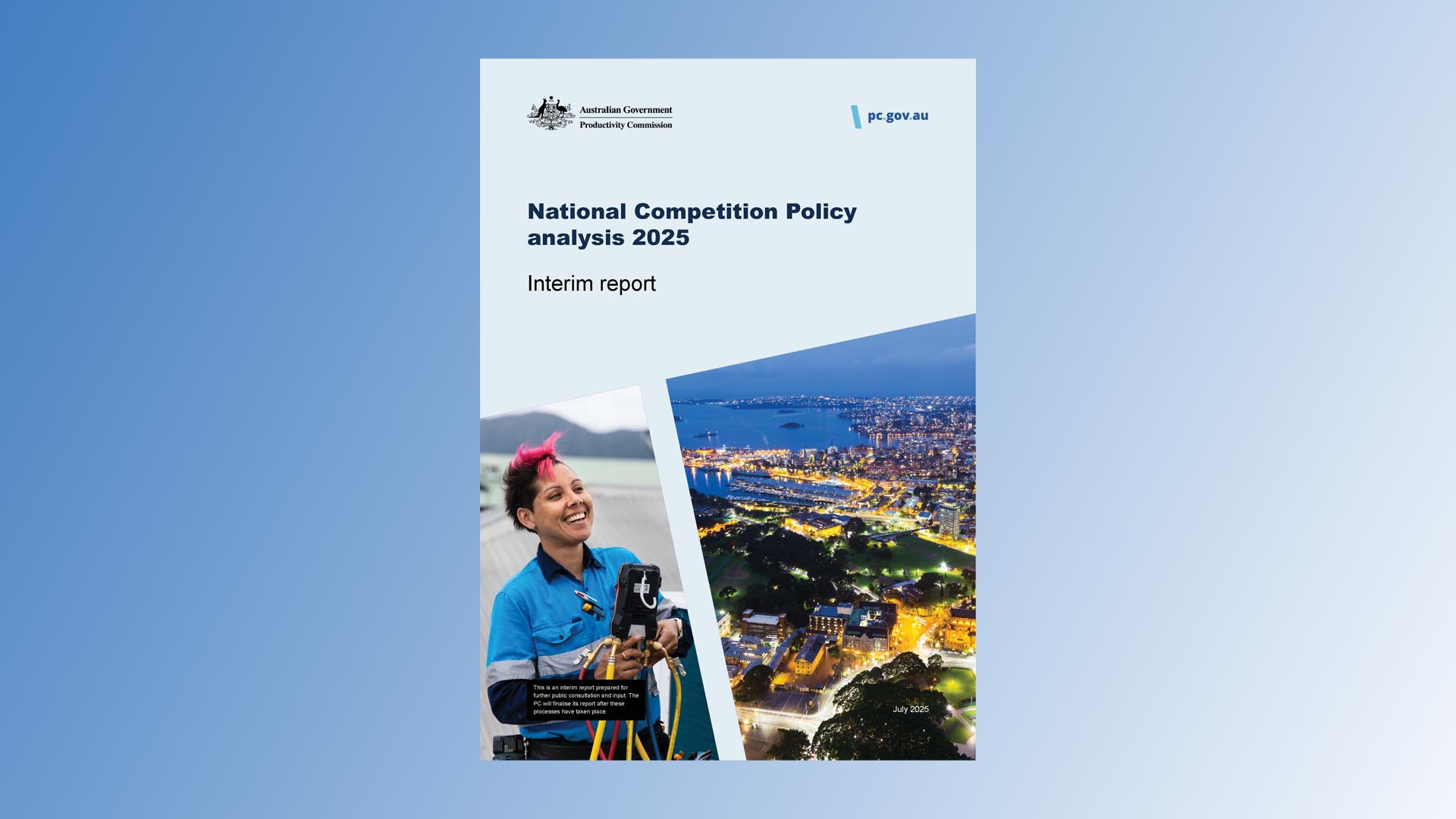Lukewarm on licensing, strong on free standards – PC releases interim report
After seeking comments on national occupational licensing and harmonisation of standards, the Productivity Commission (PC) has released its interim recommendations and is calling for further feedback.

The interim report is the next step in a larger process to find ways to boost productivity in Australia. This report focuses on two specific policy reforms: national occupational licensing to promote labour mobility, and harmonising and improving access to standards.
In its headline findings, the PC leans towards a review and improvement of the existing automatic mutual recognition program between state and territory licensing regimes, rather than a completely new national occupational licensing regime. At the same time, it recommends a full review of standards that are called up in legislation, and supports government funding to make them freely accessible.
Occupational licensing
National occupational licensing has long been a discussion point in the HVAC&R industry, with many stakeholders strongly advocating for a harmonised licensing system across all states and territories that covers both occupational and environmental concerns.
Although electrical trades are called out as the main cohort who could benefit from national occupational licensing, the reform is also aimed at other trades. Indeed, the report features a refrigeration and air conditioning technician on its cover.
The report finds that providing labour mobility for high‑risk licensed occupations across Australia could be worth up to $846 million per year (0.04% of GDP), though the financial calculations are complicated, and the number quoted is an upper bound. For electrical and related trades, the PC expects the benefit of free labour mobility to be between $51 and $62m per year.
The report notes that mutual recognition and automatic mutual recognition, if implemented successfully across all jurisdictions and occupations, could offer similar benefits.
Accordingly, the PC is recommending that the Australian government (in consultation with state and territory governments) instigate an already agreed independent evaluation of the Automatic Mutual Recognition scheme.
The PC is also seeking information on the costs of complying with occupational licensing requirements when moving interstate, to better understand the potential benefits to productivity.
Harmonising standards
In the other major part of its review, the PC looked at whether harmonisation of standards across Australia and internationally could improve productivity by lowering compliance costs for businesses, lowering administrative costs for government, and improving consumer choice by increasing the range of products available in Australia.
In its analysis, the PC found that of the 893 standards incorporated into legislation in at least one jurisdiction, 21 (2%) were not aligned with an existing international standard, 197 (22%) were identical to, or based closely on, an international standard, and 675 (76%) had no equivalent international standard and were bespoke Australian Standards.
The PC notes that where no matching international standard exists, it may be possible to reduce trade barriers by also permitting compliance in the legislation with appropriate overseas standards (regulated or voluntary). It also found that 90% of these standards were in three sectors: manufacturing; professional, scientific and technical services; and construction.
According to the PC, expanding legislation to permit compliance with international or overseas standards for all of the estimated 21 mandated current Australian Standards not aligned with an existing international standard, along with a quarter (169) of the 675 mandated Australian Standards where no international standard exists, would bring a total benefit of $1.9bn-$3.8bn per year (0.1-0.2% of GDP).
In line with this, the PC is seeking specific examples from stakeholders where international or overseas standards could be adopted or recognised as equivalent, including any information or data on the expected costs and benefits of alignment.
Other issues highlighted in the interim report are regulations that clash with international standards, creating barriers for exports and imports; inconsistencies in referenced standards across jurisdictions; and regulations that call up outdated standards. According to the PC, as at July 10, 2025, Australian Standards were incorporated 3,743 times in Commonwealth, state or territory legislation (sometimes the same standard referenced multiple times). Of these, 1,403 (37%) are references to Australian Standards that are superseded, obsolete or withdrawn.
In line with these findings, the PC is recommending a review of standards and legislation to improve harmonisation with international standards, and within Australia.
Momentum building for free standards
Another major recommendation in the interim report is to provide low-cost or free access to mandated standards. The PC notes that this is in line with the fundamental principle of transparency and accessibility of legal requirements. It also says the benefits of harmonisation are unlikely to be maximised if there is a barrier to businesses accessing harmonised standards.
Accordingly, the PC recommends that governments should facilitate free or low-cost access to standards incorporated in legislation. The cost of providing this access should also be considered in any assessment of the costs and benefits of proceeding with a regulated standard.
Written feedback can be submitted via the consultation website until September 5.
The Productivity Commission has been tasked with providing a final report to government by October 31, 2025.
PREV
NEXT
Comments
Advertisements
Recent news
- Daikin launches turnkey refrigeration solution
- Mike Lenton retires from HydroChem
- Report forecasts skyrocketing energy use in Australian data centres
Latest events
- PSO to host focus groups at AIRAH Hobart Industry Night
- Huge attendance for 2026 ASHRAE Winter Conference
- Final call for 2026 ARBS Awards nominations
 Mark Vender
Mark Vender

Leave a Reply